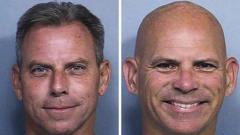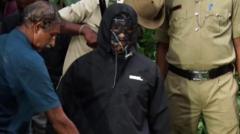The judge's decision to resentence the brothers sparks emotional responses and mixed reactions amid calls for justice and rehabilitation.
**Menendez Brothers Granted New Chance as Judge Reduces Sentences**

**Menendez Brothers Granted New Chance as Judge Reduces Sentences**
California court ruling offers hope for Erik and Lyle Menendez as they become eligible for parole after decades in prison.
The recent ruling by Los Angeles County Judge Michael Jesic to resentence Erik and Lyle Menendez has ignited debate and emotion, as the brothers, long imprisoned for the 1989 murders of their parents, now stand eligible for parole. The judge reduced their life sentences to 50 years to life, prompting a scheduled hearing by the state parole board to consider their release next month.
The district attorney's office expressed significant concern, arguing against leniency, highlighting the brothers' lack of rehabilitation and the brutal circumstances surrounding the murders. The Menendez brothers maintain that they acted in self-defense against years of sexual abuse inflicted by their parents, a narrative that has drawn continued interest and divided public opinion.
During the resentencing hearing, the brothers offered heartfelt apologies, discussing the traumatic experience of the murders and the lasting consequences of their actions. Erik Menendez, 54, reflected on the "shock" and "betrayal" their parents must have felt, while Lyle Menendez, 57, shared his remorse for the impact of his actions on family members.
The sentiment in the courtroom shifted as family members expressed hope for the future at the brothers’ potential release, marking the occasion as a "great day" for their family. Their cousin, Anamaria Baralt, passionately advocated for the brothers, emphasizing their transformation and acknowledgment of past misdeeds.
In contrast, the district attorney’s office pointed to the brothers’ history of deceit and their ongoing narrative of victimhood. They highlighted concerns over the claim of rehabilitation, questioning the credibility of the brothers' narratives given their past.
The ruling comes amidst renewed interest in the Menendez case, spurred by a recent Netflix drama that has captured public attention. This resurgence has led to renewed calls for their release from high-profile figures, including celebrities and former officials who echo the need for justice transformation.
Looking ahead, the brothers await a hearing on June 13, where the parole board will assess the potential risk they pose to society if released. Additionally, California Governor Gavin Newsom is reviewing a separate clemency request from the brothers that may further affect their sentences.
The Menendez brothers are left to navigate the complexities of their future, balancing the weight of their past actions against the hope for redemption and a new beginning after decades of incarceration. The discussion surrounding their case continues to unfold as communities reflect on themes of justice, rehabilitation, and the nuances of accountability.
The district attorney's office expressed significant concern, arguing against leniency, highlighting the brothers' lack of rehabilitation and the brutal circumstances surrounding the murders. The Menendez brothers maintain that they acted in self-defense against years of sexual abuse inflicted by their parents, a narrative that has drawn continued interest and divided public opinion.
During the resentencing hearing, the brothers offered heartfelt apologies, discussing the traumatic experience of the murders and the lasting consequences of their actions. Erik Menendez, 54, reflected on the "shock" and "betrayal" their parents must have felt, while Lyle Menendez, 57, shared his remorse for the impact of his actions on family members.
The sentiment in the courtroom shifted as family members expressed hope for the future at the brothers’ potential release, marking the occasion as a "great day" for their family. Their cousin, Anamaria Baralt, passionately advocated for the brothers, emphasizing their transformation and acknowledgment of past misdeeds.
In contrast, the district attorney’s office pointed to the brothers’ history of deceit and their ongoing narrative of victimhood. They highlighted concerns over the claim of rehabilitation, questioning the credibility of the brothers' narratives given their past.
The ruling comes amidst renewed interest in the Menendez case, spurred by a recent Netflix drama that has captured public attention. This resurgence has led to renewed calls for their release from high-profile figures, including celebrities and former officials who echo the need for justice transformation.
Looking ahead, the brothers await a hearing on June 13, where the parole board will assess the potential risk they pose to society if released. Additionally, California Governor Gavin Newsom is reviewing a separate clemency request from the brothers that may further affect their sentences.
The Menendez brothers are left to navigate the complexities of their future, balancing the weight of their past actions against the hope for redemption and a new beginning after decades of incarceration. The discussion surrounding their case continues to unfold as communities reflect on themes of justice, rehabilitation, and the nuances of accountability.


















